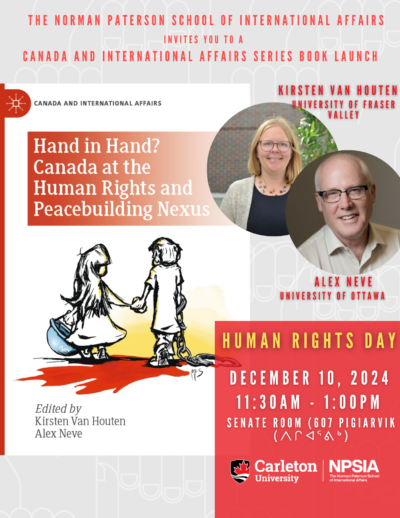Past Event! Note: this event has already taken place.
Hand in Hand? Canada at the Human Rights and Peacebuilding Nexus
December 10, 2024 at 11:30 AM to 1:00 PM
| Location: | 607 Pigiarvik (ᐱᒋᐊᕐᕕᒃ) |
| Cost: | Free |
 Please join us for a conversation with the authors and editors of “Hand-in-Hand? Canada at the Human Rights and Peacebuilding Nexus” on December 10, 2024 at 11:30 in the University Senate Room. This book brings together authors from civil society and academic backgrounds who explore how foreign policy actors develop and implement policy; undertake advocacy and diplomacy and; contribute to peace and justice efforts at the nexus, in sometimes contradictory ways. During this presentation three early-career scholars and activists, including two NPSIA alumni, will provide an overview of the contributions that they co-authored with more senior colleagues. Their co-authors will reflect on where they have observed the nexus in their own work as practitioners and academics.
Please join us for a conversation with the authors and editors of “Hand-in-Hand? Canada at the Human Rights and Peacebuilding Nexus” on December 10, 2024 at 11:30 in the University Senate Room. This book brings together authors from civil society and academic backgrounds who explore how foreign policy actors develop and implement policy; undertake advocacy and diplomacy and; contribute to peace and justice efforts at the nexus, in sometimes contradictory ways. During this presentation three early-career scholars and activists, including two NPSIA alumni, will provide an overview of the contributions that they co-authored with more senior colleagues. Their co-authors will reflect on where they have observed the nexus in their own work as practitioners and academics.
Registration: Hand in Hand?
Introduction: Presented by Kirsten Van Houten
Kirsten Van Houten was recently appointed as an Assistant Professor in the School of Social Justice and Global Stewardship at the University of the Fraser Valley, she also has adjunct appointments at the University of Guelph and Norman Paterson School of International Affairs. Her research focuses on the human rights and peacebuilding nexus in Canadian foreign policy and gender, civil society and disability inclusion in hybrid peacebuilding.
Reconciliation, Foreign Policy, and Global Affairs Canada: A Mismatch between Rhetoric and Practice in GAC’s Action Plan on Reconciliation with Indigenous Peoples: Presented by Lily Schricker
Lily M. Schricker is a first generation Canadian of German ancestry. She is a B.C.L/J.D. student at McGill University’s Faculty of Law. She is an Emerging Scholar at the Network for Strategic Analysis. Recently, she completed an M.A. in International Affairs from the Norman Paterson School of International Affairs. Lily’s research interests focus on the intersection of reconciliation, Indigenous self-determination, and Canadian foreign policy.
Canada and the Women, Peace and Security Agenda: Reconciling Ambition, Challenges, and Policy Coherence: Presented by Madison Filmore and Discussed by Beth Woroniuk
Madison Fillmore is a PhD student at the School of International Development and Global Studies at the University of Ottawa. She holds an MA from the Norman Paterson School of International Affairs. Her current research focuses on WPS, gender and conflict, and peacebuilding.
Beth Woroniuk is the co-founder and past chair of the Women, Peace and Security Network-Canada. She has worked on WPS issues for over 25 years, with a focus on monitoring the Canadian government’s implementation of its commitments. She researches, advocates, and advises on feminist foreign policy and development assistance investments in gender equality.
Why Canada needs to promote a Children, Peace, and Security agenda: Presented by Madeline Zutt and Discussed by Shelly Whitman
Madeline Zutt is a Policy and Advocacy Officer at the Dallaire Institute for Children, Peace, and Security. She has a BA in Political Science from the University of Toronto and an MSc in International Relations and Diplomacy from Leiden University in the Netherlands.
Dr. Shelly Whitman is the Executive Director of the Dallaire Institute for Children, Peace, and Security based at Dalhousie University. Prior to this role, Dr. Whitman was the Deputy Director of the Centre for Foreign Policy Studies at Dalhousie. In addition, she is an Adjunct Professor in Political Science and International Development Studies at Dalhousie.
Change-making in disability, peace, and development: Lessons from the life and legacy of Steven Estey: Presented by David Black
David Black is the Lester B. Pearson Professor of International Development Studies and Professor of Political Science at Dalhousie University. His research interests include: Canadian involvement in Sub-Saharan Africa, including development cooperation, human security, extractive sector investment, and multilateral diplomacy; post-apartheid South African foreign policy; disability and global development; and sport in global politics and development.
Conclusion: Presented by Alex Neve
Alex Neve is an adjunct professor in international human rights law with the faculties of law at the University of Ottawa and Dalhousie University, as well as a visiting professor of international human rights with the Faculty of Social Sciences and a senior fellow with the Graduate School of Public and International Affairs at the University of Ottawa. He served as Secretary General of Amnesty International Canada’s English Branch from 2000 – 2020. He is a lawyer, with a Master’s Degree in International Human Rights Law from the University of Essex. He is an Officer of the Order of Canada.